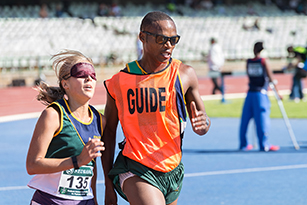
Louzanne Coetzee (left) running the 5 000 m at the Nedbank National Championships at the Free State Athletics stadium with her guide, Khotatso Mokone (right)
Photo: Celeste Klopper Photography
|
Whether it’s the 5 000 m or the 1 500 m, Louzanne Coetzee is breaking records in all her races. Fans of the University of the Free State (UFS) student were elated at her triumph with the 5 000 m T11 world record at the Nedbank National Championships for the Physically Disabled on Wednesday 23 March 2016.
The record, which has stood for 16 years, was shattered by Coetzee’s stellar 19:17.06 performance. Sigita Markeviciene’s long-standing mark of 20:05.81, set at the 2000 Paralympics in Sydney, was bettered by 48.75 seconds when Coetzee and her guide, Khotatso Mokone, sprinted hand in hand past the finish line.
Coetzee’s coach is as elated as the world-class athlete’s fans over her officially becoming the first totally blind female to clock sub-20 minute in the 5 000 m. "I am proud and grateful. She earned it through and through. She worked hard for this,” said Rufus Botha.
The experience was a surreal one for Coetzee. “It was unreal but it is exciting to be the fastest in Africa and the world. I could not have done it without the support system that I have,” she said.
"I have seldom met a student with the character and humanity of Louzanne Coetzee; she represents the best of campus and country, and is a stunning example of what we canal achieve despite the great challenges of the present," said Prof Jonathan Jansen, Vice-Chancellor and Rector of the UFS.
New African record holder
Two days before breaking the 5 000 m world record, Coetzee set a new African record in the 1 500 m. She lowered the mark from 5:27:21 to 5:18:44, which placed her at the number nine spot in the world.
On Friday 18 March 2016 Coetzee had broken her own South African record when she ran 5 000 m in less than 20 minutes at the Free State Championships. However, the race is not an official (International Paralympic Committee) meeting, and hence remains unofficial.
What’s next?
The gold medallist is currently preparing for the Athletics Grand Prix to be held in Switzerland in May for which she is raising funds. If she is selected by SASCOC (South African Sports Confederation and Olympic Committee), her next stop is the Paralympic Games in Rio de Janeiro, which is just six months away.